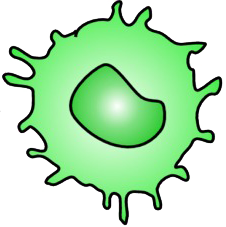|
|
| (3 intermediate revisions by the same user not shown) |
| Line 1: |
Line 1: |
| − | *Primary immunodeficiencies may affect either the [[Innate Immune System - WikiBlood|innate immune system]] or the [[Adaptive Immune System - WikiBlood|adaptive immune system]]
| + | {{frontpage |
| − | *They are categorised by either the type or the developmental stage of the cells involved
| + | |pagetitle =Primary Immunodeficiency |
| − | *Lymphoid cell disorders affect [[Lymphocytes#T cells|T cells]] or [[Lymphocytes#B cells|B cells]] (or both)
| + | |pagebody =Primary immunodeficiencies may affect either the [[Innate Immune System|innate immune system]] or the [[Adaptive Immune System|adaptive immune system]]. They are categorised by either the type or the developmental stage of the cells involved. Lymphoid cell disorders affect [[Lymphocytes#T cells|T cells]] or [[Lymphocytes#B cells|B cells]] (or both). Myeloid cell disorders affect phagocytic function. The severity of the immunodeficiency depends on at which stage in development the problem occurs. E.g. Defects early on in development will affect the entire immune system. |
| − | *Myeloid cell disorders affect phagocytic function
| + | [[Lymphocytes#T cells|T cell]] deficiencies can affect both the cell-mediated and humoral response as [[Lymphocytes#T cells|T cells]] play a central role in the immune system. |
| − | *The severity of the immunodeficiency depends on at which stage in development the problem occurs
| + | |contenttitle = Content |
| − | **E.g. Defects early on in development will affect the entire immune system
| + | |contentbody =<big><b> |
| − | *[[Lymphocytes#T cells|T cell]] deficiencies can affect both the cell-mediated and humoral response as [[Lymphocytes#T cells|T cells]] play a central role in the immune system
| |
| | | | |
| − | [[Primary Innate Immunity Deficiencies]]
| + | <categorytree mode=pages>Primary Immunodeficiency</categorytree> |
| | | | |
| − | ===Deficiencies of Adaptive Immunity=== | + | |logo = Immature MDDC.png |
| | + | }} |
| | | | |
| − | ====Equine Severe Combined Immune Deficiency (Equine SCID)====
| |
| − | *Autosomal recessive
| |
| − | *Occurs in 2-3% of Arabian foals
| |
| − | *Defect in DNA-dependent protein kinase gene
| |
| − | **Gene codes for a DNA repair enzyme involved in V(D)J recombination for antigen receptors of [[Lymphocytes|lymphocytes]] (e.g. Ig and TCR)
| |
| − | *No functional [[Lymphocytes#B cells|B cells]] or [[Lymphocytes#T cells|T cells]]
| |
| − | *Foals develop infections (usually around 8 weeks of age as maternal [[Immunoglobulins|antibody]] in [[Materno-Fetal Immunity - Introduction#Passive transfer via colostrum|colostrum]] wanes around this time)
| |
| − | *Foals usually die from bronchopneumonia
| |
| − |
| |
| − | ====Canine X-Linked Severe Combined Immune Deficiency (Canine SCID)====
| |
| − | *Affects Basset Hounds and Corgis
| |
| − | *X-linked recessive defect in the gene coding for the IL-2 receptor
| |
| − | **IL-2 receptor is a receptor for the cytokine IL-2 which causes [[Lymphocytes#T cells|T cells]] to proliferate
| |
| − | *Causes lymphoid hypoplasia, stunted growth and increases the animal's susceptibility to infection
| |
| − | *Animal usually dies from pneumonia or sepsis as the level of maternal [[Immunoglobulins|antibody]] decreases
| |
| − |
| |
| − | ====Selective [[IgA]] deficiency of German Shepherd Dogs====
| |
| − | *Poorly understood
| |
| − | *Linked to other disease syndromes such as deep pyoderma, inflammatory bowel disease, anal furunculosis and disseminated aspergillosis
| |
| − | *[[Immunoglobulin A|[[IgA]]]] deficiency so more susceptible to mucosal disease
| |
| − |
| |
| − | ====Immunodeficiency of Weimaraners, Irish Wolfhounds and Miniature Dachshunds====
| |
| − | *Unknown aetiology
| |
| − | *Inherited defects
| |
| − | *Low levels of circulating [[Immunoglobulin M|IgM]] and [[Immunoglobulin G|IgG]]
| |
| − | *Impaired [[Neutrophils|neutrophil]] function
| |
| − | *Causes recurrent pyrexia and infections
| |
| − | **E.g. Rhinitis and bronchopneumonia in Irish Wolfhounds due to low [[Immunoglobulin A|[[IgA]]]]
| |
| − | **E.g. Pneumocytosis in Miniature Dachshunds due to low [[Immunoglobulin G|IgG]]
| |
| − |
| |
| − | ===Laboratory Examples of Severe Combined Deficiency===
| |
| − | [[Image:Nude Mouse.jpg|right|thumb|150px|Athymic Nude Mouse - Armin Kübelbeck 2008]]
| |
| − | *Severe Combined Immune Deficiency(SCID)
| |
| − | **No functional [[Lymphocytes#B cells|B cells]] or [[Lymphocytes#T cells|T cells]]
| |
| − |
| |
| − | *Athymic nude mice (no [[Thymus - Anatomy & Physiology|thymus]])
| |
| − | **No functional [[Lymphocytes#T cells|T cells]]
| |
| − | **Cell-mediated immunodeficiency
| |
| − |
| |
| − | *Knock-out mice
| |
| − | **E.g. Gene coding for CD4, CD8, IL-10 removed
| |
| | | | |
| | [[Category:Immunodeficiencies]] | | [[Category:Immunodeficiencies]] |
